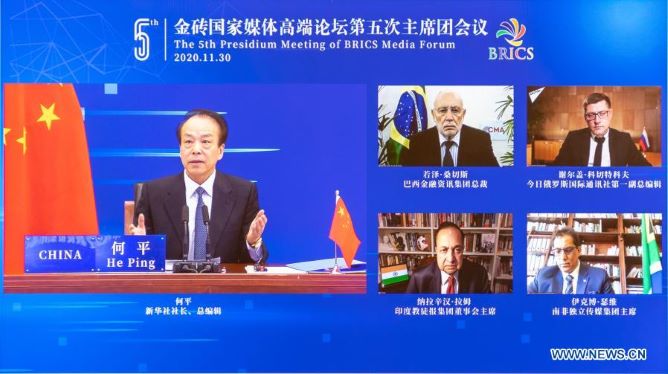Beijing November 30 (Xinhua/The Hindu): The fifth presidium meeting of the BRICS Media Forum was held via video link on Monday, November 30, after the BRICS with members pledging joint efforts to improve the forum mechanism and step up post-COVID-19 exchanges and cooperation among BRICS media.
At the media forum, held virtually to coincide with the recently concluded BRICS summit, media organizations discussed ways in which journalists from the grouping could collaborate more closely to tell stories, with the countries facing many similar challenges, from economic issues to public health, as they grapple with COVID-19.
The executive chairman of the BRICS Media Forum, Hi Ping, said that in the fight against COVID-19, media organizations from BRICS countries have actively fulfilled their social responsibilities, chronicling BRICS’ joint fight against the pandemic and facilitating mutual assistance and support between peoples of BRICS countries.

He Ping, is President and Editor-in-chief of China’s Xinhua news agency, which came up with the idea of a BRICS Media Forum in 2015. The BRICS Media Forum was proposed by Xinhua News Agency and jointly initiated with mainstream media outlets from Brazil, Russia, India and South Africa, with the forum presidium as its top decision-making body.
Amid momentous changes never seen in the last hundred years, BRICS media outlets should grasp the trend of history and act as “facilitators” for peaceful development, He Ping said.
He urged BRICS media outlets to be aware of the general trend of global development and be “narrators” of the BRICS story, follow the evolution trends of media and be “leaders” in innovative development, and give full play to the advantages of BRICS collaboration and be “pursuers” of pragmatic cooperation.
He said that Xinhua is willing to strengthen cooperation with media from other countries to provide spiritual impetus for defeating the pandemic, reviving the economy and building a community with a shared future.
The pandemic had only reinforced the needs of the countries to step up, rather than shun, cooperation.
“In times of crisis, no one can stand alone or stay immune,” He pointed out. “As a Chinese saying goes, fire tests gold, and adversity reveals friendship.”
“The BRICS Media Forum can make a real difference in the fight against motivated and harmful disinformation by promoting and strengthening relevant media exchanges, workshops, training of journalists, and interactions with technology companies that are willing to work with us to contain and end the menace,” He added.

N.Ram
The Director of The Hindu Publishing Group and former Editor-in-Chief of The Hindu Group of Publications, Narasimhan Ram noted that India, Brazil and Russia were among the five in the world with the highest number of confirmed cases.
“The news media around the world, especially daily newspapers, and also other forms of the media, have taken a big hit during the pandemic,” Ram added.
“But it is heartening that media organizations that come under the aegis of the BRICS Media Forum have done a commendable job in informing and educating readers, viewers, and listeners on the pandemic and its consequences for people’s lives, health, livelihood, and well-being; on the tools and individual and social behaviors that can enable a country or a community to mount defenses against this coronavirus; on the development of diagnostics, therapeutics, and vaccines for COVID-19; and on the science behind all this,” Ram stated.
“I believe the mainstream media in our five countries have also helped by fielding well-informed discussions on how to strike a reasonable balance, tricky as it is, at the policy level between saving lives and health on the one hand and protecting work, livelihood, and the economy on the other,” he added.
Ram observed that disinformation that was being “transmitted globally at warp speed on the so-called technology platforms, notably Facebook, Twitter, Google, WhatsApp, and Instagram” was “a major threat not just to the mainstream media, but, more importantly, to the lives and well-being of tens of millions of people and the safety and integrity of society as a whole.”
“For example, rigorous fact-checking and investigation by well-trained teams of journalists and the new type of specialised fact-checking organisations can be supplemented by technological solutions, with the deployment of technologies like AI, in the fight against disinformation, especially large-scale online harms. BRICS countries have advantages in doing both things.”
Jose Juan Sanchez
Jose Juan Sanchez, President of Brazil’s CMA Group that specializes in financial and agri-business news, said a common thread was a growing problem of disinformation or ‘fake news’.
“We need to come together to fight disinformation. It is important for news to be instantaneous, and it is equally important to remember that false news is dangerous. Transparent and reliable information is important more than ever,” he asserted.
The forum was also attended by Sergey Kochetkov, Deputy Editor-in-chief of Rossiya Segodnya (Russia’s state-owned news agency), whose subsidiaries include Sputnik and RIA Novosti; Iqbal Surve, and the Executive Chairman of Independent Media in South Africa.





























































